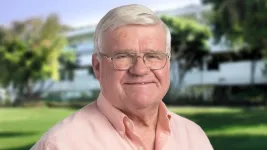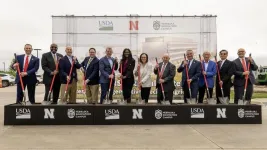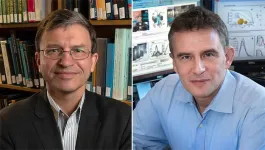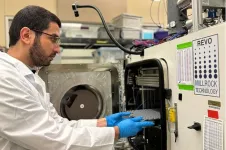(Press-News.org) As people have more difficulty distinguishing fact from fiction in the United States, they are more likely to feel news fatigue and avoid news altogether, according to a University of Michigan study.
More than an unintentional avoidance because of lack of media exposure, the researchers say people actively avoid news.
The researchers also find that people who identify as strong Democrats begin relying more on nonpartisan news media when feeling misinformed, while people who identify as strong Republicans report using less news media overall, including less conservative news media. Their results are published in Journalism Studies.
"The more confusing or difficult to navigate that you find the news environment, the more you actively avoid news—but it's not just news," said lead author Ariel Hasell, U-M assistant professor of communication and media and faculty affiliate of the Center for Political Studies at the Institute for Social Research. "News avoidance also includes people avoiding discussing politics with others as well. So it's not just not consuming news, you're stepping out of the conversation completely."
Hasell and Audrey Halversen, U-M doctoral student in communication and media, drew data from three waves of a national online survey of adults in the United States. The first two waves were collected leading up to the 2020 presidential election, and the final wave was collected shortly after. Nearly 1,200 adults completed the surveys, and the sample closely resembled the U.S. adult population.
The researchers asked the respondents to rate their feelings of being misinformed online, their active news avoidance, their news fatigue and their online news media use. They also asked the respondents detailed questions about what kinds of news and news websites they read, and found that news avoidance and fatigue increased leading up to the 2020 presidential election.
Additionally, the researchers showed that being white, conservative and using more conservative media were all significantly associated with feeling more misinformed online, while political interest, political knowledge and nonpartisan news use were significantly associated with feeling less misinformed online.
"For a lot of people, public discussion about misinformation, the crowdedness of digital media environments and social media, and the amount of information that comes out from so many different sources, drives them away from news," Hasell said. "There's this paradox that the more information that is available, the more people just opt out because it becomes too hard for them to make sense of it."
Hasell says she thinks the United States' low trust environment is contributing to the effect.
"That is, when we don't trust institutions, we don't have those mental shortcuts to determine whether nonpartisan news outlets are sharing information viewers can trust," she said. "Ten years ago, 20 years ago, 30 years ago, we had a higher trust environment. Even among Democrats, the trust in mainstream news is declining. If you looked at another Western democracy that had more institutional trust in the news media, I'm not sure you would get this same effect."
Study: Feeling misinformed? The role of perceived difficulty in evaluating information online in news avoidance and news fatigue
END
More feelings of misinformation, more news avoidance, U-M study shows
2024-05-07
ELSE PRESS RELEASES FROM THIS DATE:
Ochsner Health named to Newsweek’s America’s Greatest Workplaces 2024 for Mental Wellbeing
2024-05-07
NEW ORLEANS, La. – Ochsner Health, a leader in patient care, research and education, has been named one of America’s Greatest Workplaces for Mental Wellbeing 2024 by Newsweek and Plant-A Insights Group. The ranking survey conducted included responses from more than 250,000 young professionals and more than 1.5 million company reviews.
Ochsner Health is committed to fostering an environment that prioritizes the mental well-being of each employee through innovative health initiatives, comprehensive support services and a culture ...
Professor emeritus John (Jack) Johnson elected to the National Academy of Sciences
2024-05-07
LA JOLLA, CA—Scripps Research professor emeritus John Johnson, PhD, has been elected to the National Academy of Sciences—one of the highest honors given to scientists. According to the Academy, members are selected “in recognition of their distinguished and continuing achievements in original research.”
“Becoming a member of the Academy is a great honor for me and the 70 graduate students and post docs that have worked in my lab since 1978, as well as numerous collaborators at Scripps and around the world,” says Johnson, who is also the Eldon R. Strahm Professor of Structural Virology in the Department of Integrative Structural ...
University of Nebraska-Lincoln, USDA partner on ground-breaking precision ag research center
2024-05-07
Construction of the National Center for Resilient and Regenerative Precision Agriculture at Nebraska Innovation Campus launched with a ceremonial turning of dirt on May 6.
The state-of-the-art research center is a partnership between the U.S. Department of Agriculture’s Agricultural Research Service, University of Nebraska–Lincoln and Nebraska Innovation Campus. The center will focus on the challenges and opportunities in agricultural innovation for the 21st century.
“There is a long history of scientific innovation and collaboration between ARS and UNL, typical of the USDA-land-grant ...
Two Brookhaven lab scientists named AAAS Fellows
2024-05-07
UPTON, N.Y. — The American Association for the Advancement of Science (AAAS) has recognized two staff scientists from the U.S. Department of Energy’s (DOE) Brookhaven National Laboratory with the distinction of Fellow: Deputy Associate Laboratory Director for High Energy Physics Dmitri Denisov and Senior Chemist Anatoly Frenkel. Each year, AAAS bestows this honor on select members whose “efforts on behalf of the advancement of science, or its applications, are scientifically or socially distinguished.” Marking the 150th anniversary of the program, new fellows ...
Chimps learn and improve tool-using skills even as adults
2024-05-07
Chimpanzees continue to learn and hone their skills well into adulthood, a capacity that might be essential for the evolution of complex and varied tool use, according to a study publishing May 7th in the open-access journal PLOS Biology by Mathieu Malherbe of the Institute of Cognitive Sciences, France and colleagues.
Humans have the capacity to continue learning throughout our entire lifespan. It has been hypothesized that this ability is responsible for the extraordinary flexibility with which humans use tools, a key factor in the evolution of human cognition and culture. ...
AI predicts tumor-killing cells with high accuracy
2024-05-07
MAY 7, 2024, NEW YORK – Using artificial intelligence, Ludwig Cancer Research scientists have developed a powerful predictive model for identifying the most potent cancer killing immune cells for use in cancer immunotherapies.
Combined with additional algorithms, the predictive model, described in the current issue of the journal Nature Biotechnology, can be applied to personalized cancer treatments that tailor therapy to the unique cellular makeup of each patient's tumors.
“The implementation of artificial intelligence in cellular therapy is new and may be a game-changer, offering new clinical options to patients,” said Ludwig Lausanne’s Alexandre ...
Study provides comprehensive analysis of Rhode Island’s unregulated drug supply
2024-05-07
PROVIDENCE, R.I. [Brown University] — A new analysis revealed the frequency of potentially lethal substances, such as fentanyl and xylazine, in counterfeit pills that had been circulating in Rhode Island’s illicit drug supply.
Study author Dr. Rachel Wightman, an associate professor of epidemiology and emergency medicine at Brown University, said the analysis provides important information about the composition of counterfeit pills, which are designed to replicate legitimate pharmaceutical pills but often lead to adverse health effects.
“The level of detail found in our analysis can help inform treatment conversations and improve patient care,” ...
Biomarker found to help identify cells that can repair damaged blood vessels
2024-05-07
INDIANAPOLIS – Researchers have discovered a protein marker to help identify cells able to repopulate in patients with damaged blood vessels. Their findings, recently published in Circulation, could lead to new therapies for people with endothelial dysfunction, a type of disorder that contributes to coronary artery disease that may occlude with plaque and lack ability to carry sufficient blood into the heart tissue causing a heart attack.
“This study is the first to establish that a single, prospective marker identifies vascular clonal repopulating endothelial cells ...
Could getting enough sleep help prevent osteoporosis?
2024-05-07
As part of the University of Colorado Department of Medicine’s annual Research Day, held on April 23, faculty member Christine Swanson, MD, MCR, described her National Institutes of Health-funded clinical research on whether adequate sleep can help prevent osteoporosis.
“Osteoporosis can occur for many reasons such as hormonal changes, aging, and lifestyle factors,” said Swanson, an associate professor in the Division of Endocrinology, Metabolism, and Diabetes. “But some patients I ...
LyoWave licenses Purdue freeze-drying innovations, enters collaboration with Millrock Technology
2024-05-07
WEST LAFAYETTE, Ind. — LyoWave Inc., a high-tech startup, is commercializing innovative microwave heating technologies developed at Purdue University that improve upon traditional lyophilization — or the process of freeze-drying perishable products — by increasing speed, cost-effectiveness and product throughput.
CEO and co-founder Drew Strongrich said LyoWave’s microwave energy innovations open new possibilities for a variety of products.
“Our technology overcomes the historic issues associated with microwave systems such as nonuniform heating, poor ...





